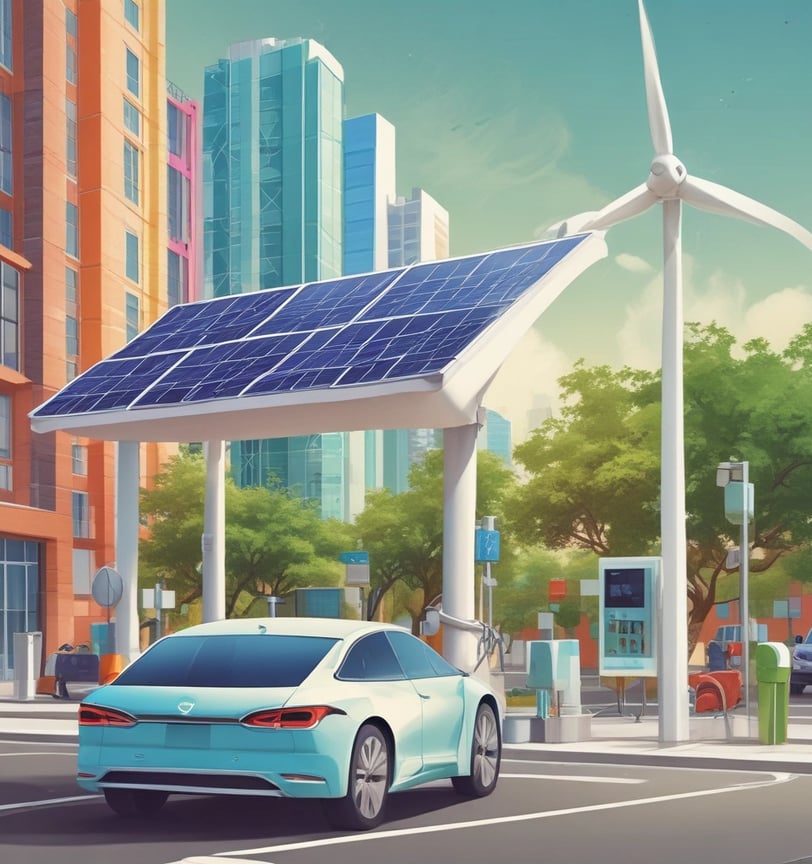“Andhra Pradesh’s Game-Changing Electric Mobility Policy 4.0: What It Means for You!”
Discover how Andhra Pradesh’s Sustainable Electric Mobility Policy 4.0 is revolutionizing transportation, fostering green jobs, and shaping a cleaner, greener future for all.
BLOG POST
evnovatech.com
12/22/20243 min read


Accelerating Green Futures: Andhra Pradesh’s Electric Mobility Policy 4.0 Unveiled.
Introduction: Pioneering a New Era in Transportation
Imagine a world where bustling streets echo not with the roar of engines but with the hum of clean, electric vehicles. Andhra Pradesh, a state known for its innovative spirit, is taking a giant leap toward this vision with the launch of its Sustainable Electric Mobility Policy 4.0. This bold initiative is not just about reducing carbon emissions; it’s about transforming the way we live, work, and commute. Let’s dive into the heart of this groundbreaking policy and explore what it means for individuals, businesses, and the planet.
What is the Sustainable Electric Mobility Policy 4.0?
The Sustainable Electric Mobility Policy 4.0 is Andhra Pradesh’s latest effort to champion environmental sustainability while fostering economic growth. This policy is designed to:
Promote Electric Vehicle (EV) Adoption: Encourage citizens to transition from conventional vehicles to EVs by offering attractive incentives and subsidies.
Develop EV Infrastructure: Build a robust network of charging stations across urban and rural areas to make EV usage seamless.
Boost Local Manufacturing: Support local industries by incentivizing the production of EV components and batteries, aligning with the ‘Make in India’ initiative.
Generate Green Jobs: Create employment opportunities in sectors like EV manufacturing, charging infrastructure, and maintenance.
Why Now? The Urgency Behind Policy 4.0
Climate change is no longer a distant threat—its effects are visible in rising temperatures, erratic weather patterns, and increasing pollution levels. Andhra Pradesh, with its rapid urbanization, has recognized the need for immediate action. The Sustainable Electric Mobility Policy 4.0 is a response to:
Environmental Concerns: Transportation contributes significantly to greenhouse gas emissions. EVs offer a cleaner alternative, reducing the state’s carbon footprint.
Economic Potential: The global EV market is booming. By positioning itself as a leader in this sector, Andhra Pradesh aims to attract investments and boost its economy.
Energy Independence: Reducing reliance on fossil fuels aligns with India’s broader goal of achieving energy security.
Key Highlights of the Policy
The Sustainable Electric Mobility Policy 4.0 is comprehensive and ambitious. Here are its standout features:
1. Financial Incentives for EV Buyers
Subsidies: Up to ₹1.5 lakh subsidy for purchasing electric four-wheelers and up to ₹50,000 for two-wheelers.
Exemptions: Waiver of road tax and registration fees for all EVs.
2. Infrastructure Development
Charging Stations: Establishing 10,000 public charging stations by 2028.
Battery Swapping: Promoting battery-swapping stations to address range anxiety.
3. Industry Support
Land Allocation: Affordable land for EV manufacturers in dedicated industrial parks.
R&D Grants: Financial aid for research and development in EV technology.
4. Skill Development and Job Creation
Training Programs: Collaborating with technical institutes to train a skilled workforce for the EV industry.
Employment Opportunities: Expected creation of over 50,000 green jobs in the next five years.
5. Environmental Goals
Emission Targets: Reduce vehicular emissions by 30% by 2030.
Renewable Energy Integration: Encourage the use of solar and wind energy in EV charging stations.
Real-World Impacts: Transforming Lives and Landscapes
This policy isn’t just about numbers; it’s about people and their stories. Take, for instance, Ravi, a small business owner in Visakhapatnam. Ravi recently switched to an electric delivery van, taking advantage of the policy’s subsidies. Not only has he reduced his operational costs, but his customers also appreciate his commitment to sustainability.
Similarly, Pooja, a college student in Vijayawada, now commutes on her electric scooter without worrying about rising fuel prices. The charging stations installed near her campus make it incredibly convenient.
Challenges and How the Policy Addresses Them
While the policy is ambitious, it’s not without challenges:
1. High Initial Costs
EVs can be expensive upfront. The policy addresses this by offering generous subsidies and tax exemptions.
2. Infrastructure Gaps
A lack of charging stations could deter potential EV buyers. The policy’s focus on widespread infrastructure development aims to eliminate this barrier.
3. Consumer Awareness
Many people are unaware of the benefits of EVs. Awareness campaigns and workshops are part of the policy to educate citizens.
Andhra Pradesh’s Role in India’s EV Revolution
By implementing this policy, Andhra Pradesh is setting a benchmark for other states. It aligns with India’s national goal of achieving 30% EV penetration by 2030. The state’s proactive approach could inspire a ripple effect, accelerating the adoption of EVs across the country.
What’s Next? Looking Ahead
The Sustainable Electric Mobility Policy 4.0 is not the end; it’s the beginning of a green revolution. The state government plans to:
Regularly review and update the policy to address emerging challenges.
Collaborate with private players to innovate and expand EV solutions.
Foster public-private partnerships to ensure the policy’s long-term success.
FAQ: Everything You Need to Know
1. Who qualifies for the subsidies under the policy?
Both individual buyers and commercial fleet operators can avail of the subsidies, provided they purchase EVs registered in Andhra Pradesh.
2. How will the government ensure the availability of charging stations?
The government plans to partner with private companies and local bodies to establish charging stations at strategic locations.
3. Are there incentives for businesses switching to EV fleets?
Yes, businesses can benefit from subsidies, reduced operational costs, and enhanced brand reputation by adopting EV fleets.
4. How will this policy impact the average citizen?
Citizens will experience lower transportation costs, improved air quality, and more job opportunities in the green economy.
